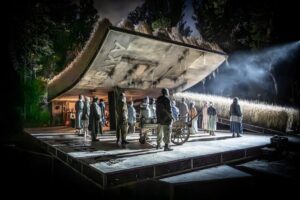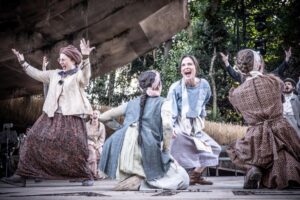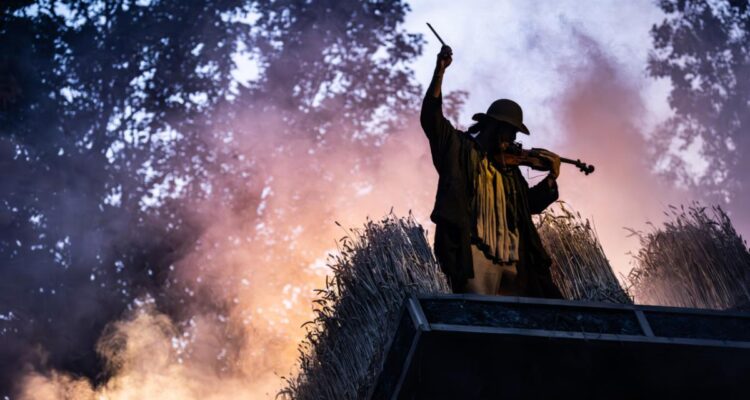This production of the musical Fiddler on the Roof grips and moves from start to finish.
Fiddler on the Roof premiered on Broadway on September 22, 1964, and ran for an impressive 3,242 performances, becoming the first musical to surpass 3,000 performances on Broadway. It held the record for the longest-running Broadway musical for nearly a decade until it was surpassed by Grease.
Jordan Fein’s direction touches the heart of the original story and captures the soul of the musical. This production brilliantly showcases entertainment while delving deeply into the cultural and historical context of the story, presenting a human story of hope in the face of adversities.
The musical’s title draws inspiration from Marc Chagall’s paintings. The narrative delves into the Jewish writer Shalom Aleichem’s (a pen name meaning “Peace be with you”) Tevye the Milkman (1894). Joseph Stein’s adaptation of Aleichem’s stories, combined with Sheldon Harnick’s lyrics and Jerry Bock’s music, offers a masterpiece that, in the hands of a creative director like Jordan Fein, becomes a dazzling and magical production.
Set against the backdrop of Tsarist Russia in a small Jewish village, Anatevka, the story centres on Tevye, a milkman, and his wife Golde, who have five daughters, three of whom are of marriageable age. The historical context includes “small pogroms” and the final expulsion of the Jews from their village, reflecting the real-life persecution faced by Jewish communities in Eastern Europe. These events add urgency and poignancy to the narrative, emphasizing the resilience and enduring spirit of the characters.

This production’s nuanced portrayal of a single Jewish family, their struggles, and their beliefs offers insights and lessons relevant to all. By combining humour with the harsh realities of life, it creates a compelling narrative that resonates on multiple levels.
Without giving away too much, the ending twist in this production is brilliant – watch for it! The music, deeply rooted in Jewish traditions and culture, captures the essence of the story’s setting in a Jewish shtetl (ghetto) in Tsarist Russia. Songs like “Tradition” and “Sabbath Prayer” are imbued with traditional Jewish melodies, lending authenticity to the narrative and the characters’ experiences.
Sheldon Harnick’s lyrics stand out for their wit, insight, and poetic quality. They not only advance the plot but also delve into the characters’ inner lives and the broader social and historical context. The lyrics often balance humour with pathos, exemplified by songs like “Tevye’s Monologue,” where Tevye humorously converses with God about his predicaments.
Adam Dannheisser superbly portrays Tevye, a character who embodies both traditional and modern fatherhood. He is keen on educating his daughters and endearingly misquotes what the ‘Good Book’ and scripture say. He welcomes and even invites new ideas, despite deep-rooted traditions. The revolutionist Perchik is invited by him, to teach his daughters in return for accommodation.
The three daughters—Tzeitel (Liv Andrusier), Hodel (Georgia Bruce), and Chava (Hannah Bristow) – infuse the domestic narrative with vibrant energy through their youthful exuberance, music, and dance. Each brings a dynamic presence to the stage, reflecting the hopes and challenges of a new generation. Their performances highlight the personal stakes within the story and contribute to the musical’s rich tapestry of emotional and cultural expression.

Raphael Papo’s nuanced and compelling portrayal of the Fiddler emphasises the character’s role as an observer and ‘commentator’, through his melodies, on the village’s events. Beverly Klein brings vibrant energy and comedic flair to Yente, the village matchmaker. Lara Pulver’s portrayal of Golde offers a delicate balance, exploring the evolving relationship between Golde and Tevye through beautiful vocal performances, particularly in “Do You Love Me?”
The set design by Tom Scutt, is evocative, featuring wheat fields on two levels that create a rural feel and offer a constant reminder of the village setting. All female characters cover their heads, though it’s unclear why the young girls do so, as it is not a traditional Jewish practice. The dream scene is brilliantly executed.
This production of Fiddler on the Roof not only provides captivating entertainment but also serves as a profound exploration of cultural identity, tradition, and change. It stands as a testament to the power of storytelling in bridging historical contexts with contemporary relevance, making it a timeless piece that speaks to audiences across generations.
Regent’s Park Open Air Theatre
Until: 28 September 2024
Running time: 2 hours 40 minutes (including interval)
Joseph Stein – Book
Sheldon Harnick – Lyrics
Jerry Bock – Music
Director: Jordan Fein
The Set & Costume Designer: Tom Scutt
Cast includes: Adam Dannheisser; Liv Andrusier; Georgia Bruce; Hannah Bristow; Daniel Krikler; Raphael Papo
Beverley Klein; Lara Pulver; Michael S. Siegel; Dan Wolff; Dickon Gough; Thomas-Lee Kidd
Photography by Marc Brenner.

